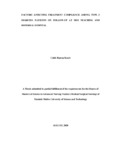FACTORS AFFECTING TREATMENT COMPLIANCE AMONG TYPE 2 DIABETES PATIENTS ON FOLLOW-UP AT MOI TEACHING AND REFERRAL HOSPITAL
Abstract
Best practice in management of chronic diseases including diabetes, requires long duration of treatment, multiple therapies and remains a major challenge in primary health care settings worldwide. Factors such as internal/external environment, healthcare system factors and factors related to medication use system are believed to affect or cause changes in the way patients take their medicine. The main objective was to document the factors affecting treatment compliance for diabetic patients at Moi Teaching and Referral Hospital, Eldoret Kenya. Analytic cross-sectional study design was used in which data was collected from 137 diabetic patients. Data collection tools including a structured questionnaire with Morisky’s eight question instrument was used, questionnaires were given out to them by a trained research assistant after which data was entered, cleaned and analyzed using Statistical Package for Social Sciences (SPSS) version 21.0 and Generalized linear model (GLM) and Multiple linear regression. The study found out that occupation had statistically significant difference (p = 0.03), there were no significant differences between patients with low and medium/high adherence for the remaining socio-demographic variables. Results show that the difference in mean adherence to treatment is not statistically significantly for each of the socio-demographic variables except for occupation where the difference between the mean MMAS-8 treatment for the unemployed patients was statistically significantly higher than that of those who were either self-employed or employed with a p value of 0.011. Results show a statistically significant difference between MMAS-8 mean score for external environment suggesting that external environment significantly influences treatment adherence by increasing levels of adherence. Health care system (p=0.12) is marginally significantly (p = 0.08) associated with adherence to treatment. In conclusion, the research findings suggest that the study participants had at least one perception that hindered them from adhering to their oral diabetic medication and there is also significant evidence that these perceptions could as well encourage them to take anti-diabetic medicine.

